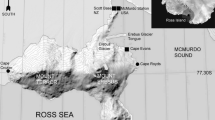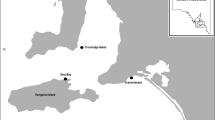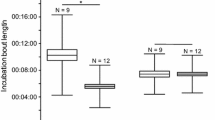Abstract.
Stone provisioning is a nest-maintenance activity accomplished by pygoscelid penguins after reliefs during the incubation/brooding period. The functional significance of this behaviour has been mainly explained as a parental strategy preventing nest flooding under detrimental weather conditions. In addition, and in the light of recent studies, this behaviour could also fit into the sexual selection process. In this study, we tested the first idea, that is, whether stone provisioning is a nest-maintenance behaviour to increase egg/nestling survival by lowering the risk of nest flooding, and can thus be considered a form of parental care. Additionally, we investigated if the effort invested by parents in nest maintenance is constrained by physiologically limiting resources. The effort of stone collection and the perceived risk of nest flooding were experimentally manipulated during the incubation and early brooding phases in a chinstrap penguin, Pygoscelis antarctica, colony. Three groups of nests were established. After weighing, control nests were left unmanipulated. In a second group of nests (reduced group), only one-half of the initial weight of stones was returned to the nests. In a third group of nests (snow-added group), we both reduced nest weight by a half and added snow outside the nest bowl over 6 consecutive days. Ten days after manipulation, the difference in nest weight between initial and final conditions was significantly related to treatment: penguins increased stone provisioning in the reduced group (44% of half-reduced nests), but drastically more in the reduced and snow-added group (123% of half-reduced nests), while the weight of control nests was unchanged compared to premanipulation conditions. The intensity of stone provisioning was affected by nest date, peaking about hatching time and shortly after, and declining with advancing chick age. These results suggest that stone provisioning is a mechanism that has evolved to prevent egg or chick mortality by nest flooding. The haematocrit, but not leukocyte numbers as expressed by the buffy coat layer, varied with the experimental conditions. Penguins investing more time in nest maintenance had a lower haematocrit, suggesting a physiological trade-off probably mediated by competition between the time devoted to nest maintenance versus foraging activities. The amount of stones collected and the haematocrit were positively related to the number of neighbour nests, so those individuals surrounded by more nests seemed to obtain benefits in the availability of nest material and energy savings. This study indicates that stone-provisioning behaviour is a nest-maintenance activity evolved to improve thermal nest characteristics potentially increasing offspring survival, and competing in time and energy with other reproductive activities. Stone provisioning in penguins should therefore be regarded as a form of parental care and an important part of individual reproductive effort in species breeding in harsh environments. Furthermore, nest size and nest-maintenance effort should be considered reproductive traits indicative of parental quality and thus could also be involved in the post-mating sexual selection process.
Similar content being viewed by others
Author information
Authors and Affiliations
Additional information
Electronic Publication
Rights and permissions
About this article
Cite this article
Fargallo, J.A., De León, A. & Potti, J. Nest-maintenance effort and health status in chinstrap penguins, Pygoscelis antarctica: the functional significance of stone-provisioning behaviour. Behav Ecol Sociobiol 50, 141–150 (2001). https://doi.org/10.1007/s002650100341
Received:
Revised:
Accepted:
Issue Date:
DOI: https://doi.org/10.1007/s002650100341




